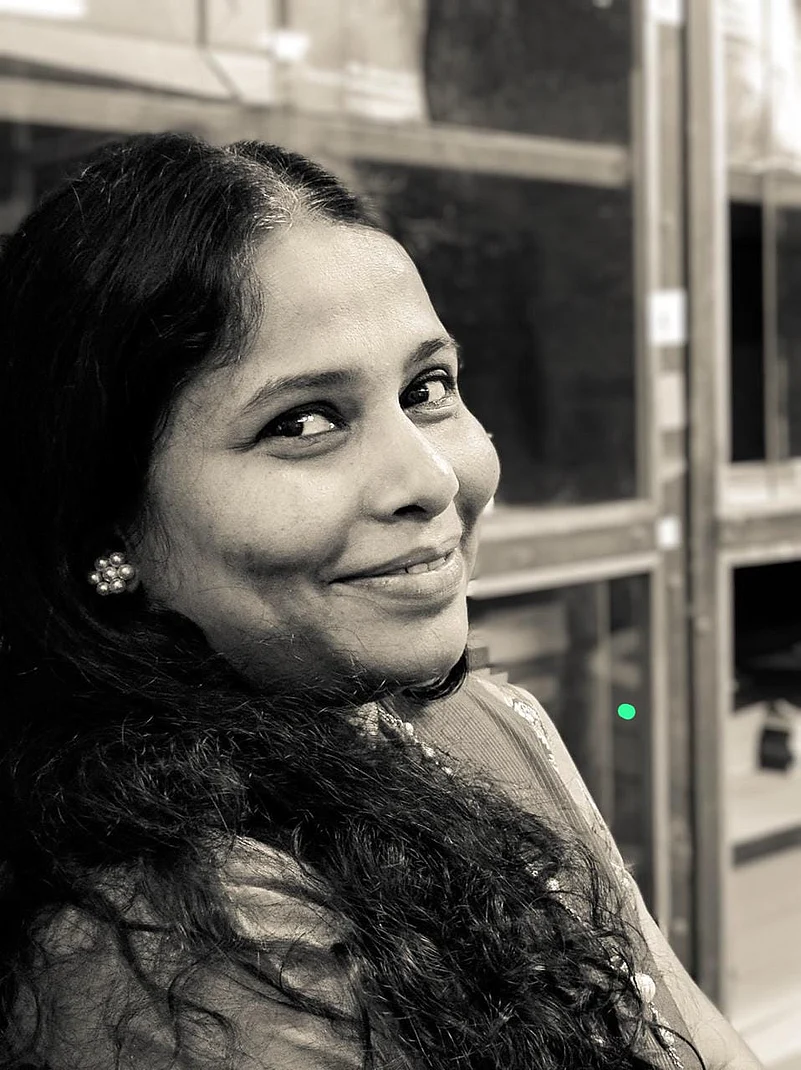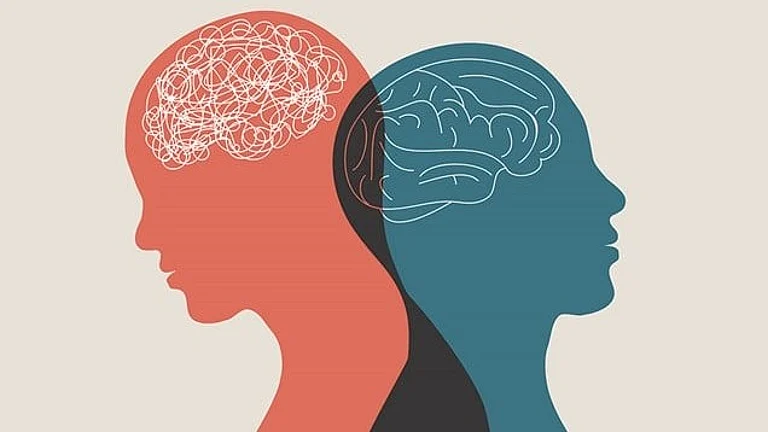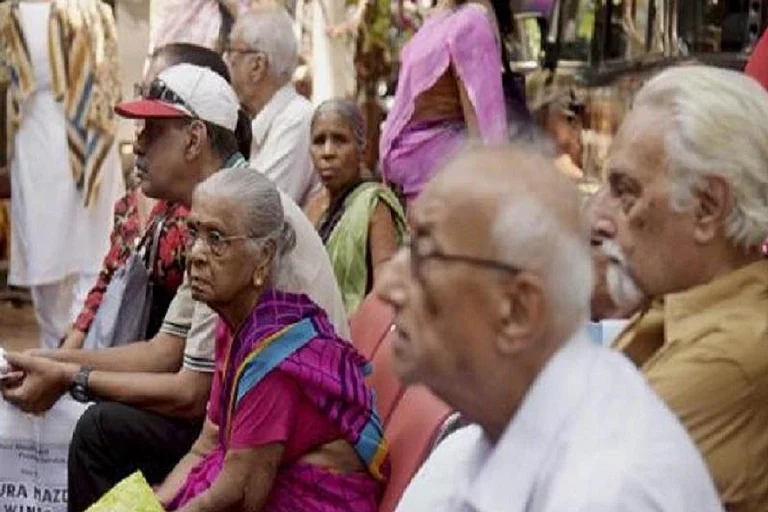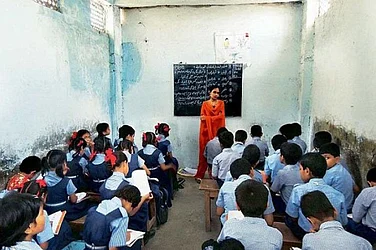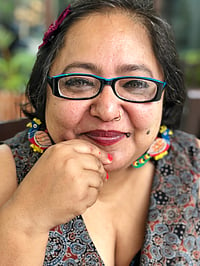
The concept of family as a support structure is shattering.
In India, there is no concept of parental care leave or compassionate care leave.
Unlike other cultures, we do not talk about loss, grief, bereavement or death-related anxiety.
What drew you to the work of geriatric mental health and geriatric care?
Several decades ago, a mentor at TISS invited me to teach a course on geriatric social work, which marked my formal entry into the field of aging. However, my true starting point was much more personal—becoming a caregiver for my father twelve years ago. That experience left me deeply shaken by the glaring lack of support systems, even for those of us belonging to a relatively privileged social class. I had the knowledge, the literacy, the resources—but even then, I struggled immensely. That’s when I realized just how much remains to be done.
This is how my journey first began; it was a collection of subjective experiences, looking at my own privilege and struggle.
My interest in aging deepened over time, especially as I noticed how much of the existing literature tends to portray older adults as a homogeneous group—often framed as dependent, frail, or living with disability. The dominant narrative seems to be one of being “dependent, sulky, and slow,” which felt reductive and misaligned with the diverse realities I was witnessing. That’s precisely why I felt a fresh wave of information was needed—one that embraces the concept of positive aging and critically examines the support mechanisms our country offers to enable active and proactive aging. While academic and policy literature may communicate one version of aging, lived experiences tell a far more nuanced story.
I was keen to understand the alternate voices. There are many, who, despite their old age, are highly independent, contributing and productive, while their narratives are not so visible. I became curious - what factors influence the octogenarians who are active?
What are the support mechanisms that the state or the country can offer?
In terms of policy, government initiatives often focus on establishing old age homes and shelters, or on providing financial security. They offer concessions for railway and air travel, and promote senior citizens’ health insurance schemes. While these measures are important, they represent only a fraction of what is truly needed. There remains a significant gap between what is offered and what older adults actually require to lead fulfilling, autonomous lives.
We are not yet an age-friendly country. A truly age-friendly city enhances mobility—it ensures that older adults can move freely and safely, whether by using public transportation, crossing roads, or accessing the places they wish to go. Mobility is not a luxury; it is a fundamental aspect of autonomy and dignity in later life. Investing in infrastructure and systems that encourage and support mobility must be a priority if we are to bridge the gap between policy provisions and the actual needs of older adults.
Thanks to the UNCRPD (United Nations Convention of Rights of Persons with Disabilities), now we have ramps and lifts, so senior citizens are also navigating certain spaces. Disability rights people are looking at how we can make the environment disability friendly, so older adults are also getting advantage of that.
In other countries, there are clubs for senior citizens where members can go and play. In India, we don’t have these facilities or they are restricted to the elite or gated communities, where we have few options like laughing or yoga club for senior citizens.
How can we be more inclusive?
We must actively promote accessibility for persons with disabilities, beginning with a shift in perspective: disability is not an individual’s problem—it is created by societal structures and mechanisms that fail to accommodate diverse needs. That’s why the focus must be on making environments and systems disability-friendly. I’ve also observed that disability and old age are often used interchangeably, which oversimplifies the aging experience. In reality, there are distinct phases of aging. There is the “young-old” stage, where individuals remain largely independent and capable, and the “old-old” stage, where functional limitations may begin to emerge. Eventually, some may experience significant physical decline due to illness or terminal conditions. Yet, despite this diversity, older adults are frequently grouped into one large, amorphous category—ignoring the nuances and individuality within the aging process.
When people stop becoming productive in a financial or a capitalistic way, how does it spiral with respect to mental health?
In a way, asking people to retire at a particular age is ageism. They are asked to go, even when there is calibre. People talk about longevity, but in certain states, retirement is at 58. So, what do they do after 58? However, some shifts and transitions are happening.
Many retired professionals attempt to re-enter the job market through consultancy or part-time roles. However, their perceived value often diminishes sharply after retirement. Someone who once earned ₹1 lakh a month may now be offered ₹30,000 for similar work. If they seek remuneration that reflects their expertise and experience, they are frequently labeled as greedy. This mindset not only undermines their contributions but also reflects a broader societal discomfort with valuing older adults beyond their formal employment years. In some places they are invited for volunteering.
On the other hand, there are also other informal spaces where older adults are working. For example, they work as farmers. But people start viewing them as a liability because they can work for only two hours, and the resources has to be shared.
The urban market, the daily wage market or the gig market is huge, but senior citizens are not even considered for recruitment because “superfast” is the expectation of the Swiggys and Zomatos. Either they are automatically excluded or are seen as a liability. They are no longer seen as profitable or economically viable, despite their wealth of experience and insight. This perception reinforces ageist attitudes and overlooks the potential of older adults to contribute meaningfully across sectors.
Are existing health issues compounded by this isolation and exclusion? How can the system help?
This issue can be viewed from multiple angles. On one hand, there is the loss or diminishing of income, coupled with declining health and rising healthcare costs—a trajectory of social causation that inevitably leads to increased vulnerability. On the other hand, the traditional concept of family as a reliable support structure is also eroding. When one falls ill, the reliance shifts to trained caregivers, who are not only difficult to find but also financially burdensome. The stress intensifies when there is no one available to provide care. This is becoming an increasingly common reality, as families undergo transitions, with many members migrating within or outside the country.
The state has to explore possibilities of how families can be supported. There is no concept of parental care leave or compassionate care leave, like childcare leave, which is usually a mother’s right. There is no legal provision for taking care of a parent—you have to go on leave without pay, there is no other option.
Monetary compensation is one factor, but some respite in the form of compassionate care leave must be provided, like some countries do. It’s not only the parents who are going through insecurities; the children who provide care suffer as well. They sometimes struggle to cope at their workplaces.
Isn’t care also about the patriarchy largely?
True. In our country, care is often offered by women. Largely, it’s feminisation of caring all the time. It may be an older wife taking care of the husband or it’s daughter-in-law caring for in-laws and the parents, or it is the daughter. Inevitably, it is a woman. This is becoming a personal struggle, and is often documented as a personal struggle.
In general discourse, it will be cited as intergenerational conflicts, vulnerability and children not taking care of their parents; even the larger media portrays it like that. But when the family is ready to care, what are the provisions? Are care givers getting any parental caregiving leave?
If caregiving were better supported, we would see more happy and willing carers. But in the current context, it often feels like an obligation. People frequently have to negotiate with colleagues to make exceptions or accommodate their caregiving responsibilities. At times, they’re met with insensitive questions—“You are three children; why can't you divide the care?” Such remarks ignore the complex realities of family dynamics. Caregiving is rarely a shared responsibility; it is typically entrusted to one person or one child, shaped by unspoken expectations and structural patterns within families.
How can we be prepared for this inevitability? Are there any conversations we can initiate?
If you look at the country data, we now have an increasing number of people living alone than before. We often see in the news that a person is found dead inside their home after a week.
Unlike many other cultures, we rarely engage in open conversations about loss, grief, and bereavement. Death-related anxiety remains largely unspoken. Even hospitals—spaces that most people encounter at some point—are ill-equipped to address these emotional and existential dimensions. The focus tends to remain on clinical markers like diabetes or blood pressure, while deeper questions are left unexplored: How does the person feel? Are they experiencing anxiety? What is the philosophical meaning of their life? What do they hope to do before they go? These difficult yet essential conversations between families and caregivers are seldom facilitated, leaving emotional needs unmet and existential concerns unaddressed.
You think the next generation is better prepared to handle these things?
I think, with the generation after this, it’s going to be largely commercial. Already, we are seeing instances of assisted caregiving. But then, it is going to take care of only a small percentage of the total population.
So, until we pump in resources proportionately for all strata of population, this is going to be a crisis, as the demographers articulate. The younger generation would not be able to hold the larger proportion of older adults.
Considering our generation, most of us still have siblings. If you’re looking at our children’s generation, most are single children looking at two sets of grandparents and one set of parents—that means they have to take care of six senior citizens without any support.
So, now is the right time and change things and it can be experimented in small ways. For instance, the focus should shift to workplace provisions for one sector and increasing government provisions for people living below the poverty line and the vulnerable sections.
Also, in terms of public health, we must emphasise on prevention and promotion. What can we do to promote activity? Why can’t there be a PHC that caters to the needs of specifically older adults? Tamil Nadu has a provision for older adults in the PHC, and efforts have to be made to make it accessible
Physical and mental health are interrelated. We have to listen to them carefully to infer the interconnectedness. Often we hear pain in their narration, there is pain, and alongside pain, there is distress associated with the pain, and disability associated to the arthritis. Loss of mobility and dependence impacts their mental health.
How can we create spaces where they can talk about what's going on in their minds? Do these spaces exist in the public domain?
In Mumbai, there is an organisation called the Adatha trust. They operate within the premise of the University spaces in Mumbai. So, senior citizens can walk in any evening and systematically get involved in activities like yoga or singing bhajans. They communicate, share their stress and discuss how to overcome that stress. It’s as simple as that. It’s not a very clinical or therapeutic approach. But still, there is a kind of therapeutic elegance that's formed. There is a purpose, there is fun and there is a collective.
Rather than only emphasising on geriatric mental health, we can also form kiosks or clubs, where people assemble, interact, do something meaningful and go back.
So, on the one side we look at prevention and promotion emphasis, and on the other, we must look at dementia, cognitive impairments, depression—what can be done for these aspects, even in the healthcare space?
When community amenities for promotion are established, a very miniscule percentage will require this high intensity resource.
Are there any proposals which have been sent to the state that are under consideration?
The Ministry of Social Justice and Empowerment has formed committees recently. This can be the starting point, but the states also have to do the needful in setting up appropriate support mechanisms, considering the diversity.







